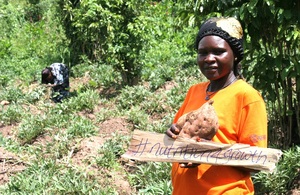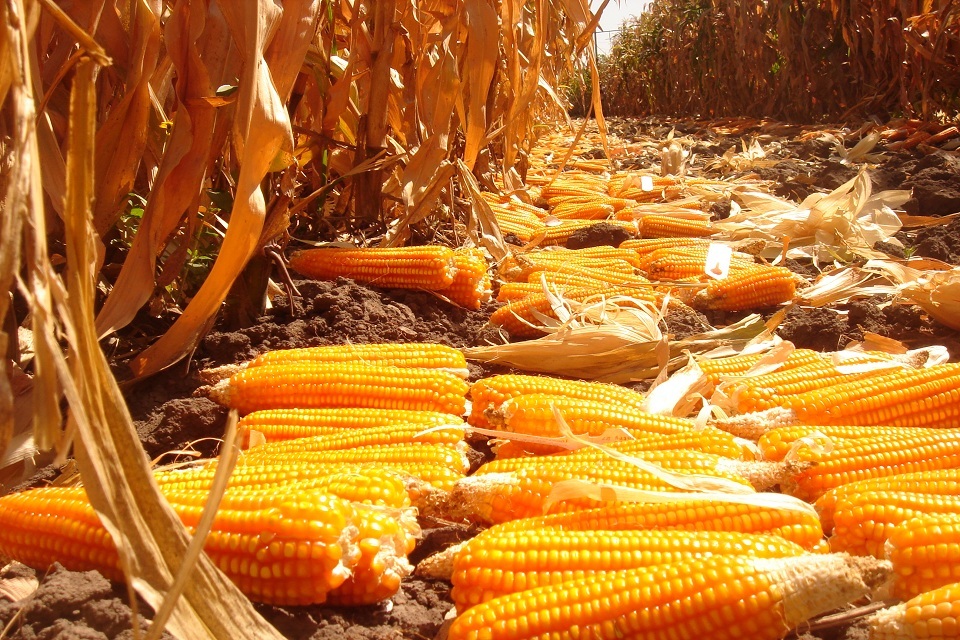DFID Research: Six super crops to help beat global hunger
A new grant has been announced at the Nutrition for Growth meeting in London

Zamzam is a commercial farmer cultivating potato plants in Luwero, Uganda. Picture: Martin Malungu/HarvestPlus
On June 8, the UK government granted £30 million to HarvestPlus to develop and deliver six nutritious crops to several million farming households in Africa and Asia.
The UK has supported HarvestPlus, an international programme of CGIAR, since its beginning in 2003. HarvestPlus leads a global effort to improve nutrition and public health by developing and disseminating staple food crops that are rich in vitamin A, zinc, and iron.
More than 2 billion people worldwide do not get enough of these crucial nutrients in their diets. This can lead to lower IQ, stunting, and blindness in children; increased susceptibility to disease for both children and adults, and exacerbated health risks to mothers - and their infants - during childbirth. According to the World Bank, malnourished children are more likely to drop out of school and have lower incomes as adults, thus reducing overall economic growth.
The grant was announced at a high-level international meeting, Nutrition for Growth: Beating Hunger through Business and Science, which was held in London, UK, and which brought together a range of partners to make strong political and financial commitments to improve nutrition globally.
In his opening remarks at the event, U.K. Prime Minister David Cameron said
It has to be about doing things differently…For science it’s about harnessing the power of innovation to develop better seeds, [and] more productive and nutritious crops…
HarvestPlus is pioneering an approach to improve nutrition by directly increasing the amounts of nutrients in seeds through plant breeding. Farmers plant these seeds and reap a healthier harvest, often providing more than half of the daily dose of vitamins and minerals needed by their families.
The first nutritious crop, developed by African scientists and released in partnership with the International Potato Center (CIP), was the orange sweet potato, which has been effective in providing up to 100% of daily vitamin A needs for young children.
Last week, the Rt Hon Justine Greening, UK Secretary of State for International Development, said:
Innovations like vitamin-enriched sweet potatoes are changing families’ lives by providing healthy nutritious food and a source of income.
The UK also committed new funding to enable CIP to reach more than one million farming households in four African countries with the orange sweet potato.
Six additional nutritious crops are now being developed through the use of conventional breeding methods: vitamin A-rich cassava and maize, iron-rich beans and pearl millet, and zinc-rich wheat and rice. The first three crops are targeted to Africa and the rest to South Asia. In 2012, new varieties of the first four crops were launched, with wheat and rice expected to follow this year. While it takes time to produce the amount of seed necessary to meet demand, up to half a million farmers will be growing these nutritious crops by the year’s end.

Ears of orange maize, enriched with beta-carotene, at the Zambia Agriculture Research Institute (ZARI). Picture: CIMMYT
HarvestPlus is now poised to get these crops into the hands of millions more farmers in Africa and Asia over the next five years, working through partnerships with both the public and private sector. Two HarvestPlus partner seed companies signed on to the ‘Global Nutrition for Growth Compact’ launched at the UK event, making a firm commitment to improving nutrition through their seed lines. These companies were Nirmal Seeds (India), which produces iron-rich pearl millet, and Seed Co (Zambia), which produces vitamin A-rich maize.
Our sweet spot is reaching rural farming communities, who still suffer the most from poor nutrition
said Dr. Howarth Bouis, Director of HarvestPlus.
Most of them are farmers who rely heavily on staple food crops to feed their families. The seed sector has a crucial role to play in getting nutritious seeds that are also high-yielding to farmers. In many cases, farmers can also save and share their seeds, or stem cuttings, with other farmers in their social networks. Our experience shows that this informal diffusion can really help to spread these crops far and wide.
HarvestPlus will also conduct more research to demonstrate how these new food crops can improve nutrition when eaten, especially for women and children, and in a cost-effective manner. Nigeria, Rwanda, India and other countries are beginning to incorporate this new food-based approach into their overall strategies for improving nutrition. As more evidence is generated, more countries are likely to follow suit.
At the UK event, Rachel Kyte, chair of the CGIAR Fund Council and World Bank Vice President for Sustainable Development, announced that CGIAR would commit to spend at least US$400 million on nutrition-relevant agricultural research over the next 3 years.
John McDermott, who directs the CGIAR Research Program on Agriculture for Nutrition and Health says
The work that HarvestPlus is doing is a key part of the broader CGIAR portfolio to use agriculture to deliver better nutritional outcomes.
HarvestPlus is part of the CGIAR Research Program on Agriculture for Nutrition and Health. CGIAR is a global agriculture research partnership for a food secure future. Its science is carried out by its 15 research centers in collaboration with hundreds of partner organizations. The HarvestPlus program is coordinated by two of these centers, the International Center for Tropical Agriculture (CIAT) and the International Food Policy Research Institute (IFPRI).